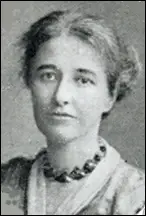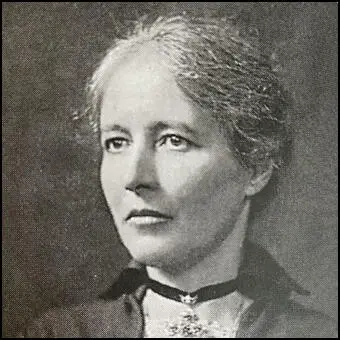Edith Ellis

Edith Ellis, one of twin daughters of John Ellis and Maria Rowntree Ellis, was born in Nottingham on 6th January 1878. Both her parents were members of the Society of Friends and her father was Liberal Party MP for Rushcliffe. (1)
Edith was educated at home by governesses and later by lecturers in London and Germany, where she studied painting and music. (2)
John Ellis and was a strong opponent of the Boer War. During the conflict Edith and Marian Ellis became involved in the Quaker relief projects for women victims of the conflict. (3)
Ellis and Marian were both opposed to the First World War and following a letter from Fenner Brockway and Lilla Brockway that appeared in Labour Leader, the newspaper of the Independent Labour Party (ILP), the No-Conscription Fellowship (NCF) was formed. (4)
The peace movement feared the introduction of conscription. "Although conscription may not be so imminent as the Press suggests, it would perhaps be well for men of enlistment age who are not prepared to take the part of a combatant in the war, whatever be the penalty for refusing to band themselves together as we may know our strength. As a preliminary, if men between the years of 18 and 38 who take this view will send their names and addresses to me at the addresses given below a useful record will be at our service." (5)
The National Committee of the NCF included Clifford Allen, Fenner Brockway, Catherine Marshall (Secretary), Bertrand Russell (chairman) and Alfred Salter (Treasurer). Ada Salter and Violet Tillard were placed in charge of Maintenance for the families of conscientious objectors. This project was largely funded by Edith and Marion, who donated "huge sums of money". (6)
As her biographer, Barry Mills, pointed out: "Edith became Treasurer of the Friends Service Committee. This had been set up by Yearly Meeting in 1915, to advise men of enlistment age. She thus held a pivotal position in the Society as its most influential communicator and spokesperson in the last years of the Great War. She personally subscribed to the more extreme ‘absolutist' view among pacifists with regard to participation in the war effort. (7)

Edith Ellis "not only insisted that true conscientious objectors should refuse any form of alternative to military service and accept imprisonment as the logical result of their stand, but she also rejected any attempts to mitigate the sufferings of those - non-Quaker as well as Quaker - who had been imprisoned." (8)
In May 1918, Edith Ellis was prosecuted under the Defence of the Realm Act, for her involvement in the publishing a pamphlet titled A Challenge to Militarism without submitting it to the Censor. (9) The Society of Friends stated that "We feel that the declaration of peace and goodwill is the duty of all Christians and ought not to be dependent upon the permission of any Government Official. We therefore intend to continue the publication of such leaflets as we feel it our duty to put forth, without submitting them to the Censor." (10)
In court, Edith Ellis stated that "because of our religious belief, we do not feel it right to submit the outcome of our deliberations to an official of Government. We believe we must act in accordance with the dictates of God, ourselves." When Edith spoke "the court was visibly impressed as, with the timbre of her woman's voice, she told in calm words of her immutable conviction." Edith was fined £100 with 50 guineas costs and subject to three months in prison on default of paying the fine, which she refused to do and it is claimed that she suffered poor health because of time in Holloway Prison. (11)
In 1919 Marian Ellis helped to establish the Fight the Famine Council in an effort to persuade the British government to end the Allied Bockade imposed on the defeated countries. On 15 April 1919, the Council set up a fund to raise money for the German and Austrian children – the Save the Children Fund. During this time Marian became friends with Charles Cripps, 1st Baron Parmoor, the President of the organisation. (12)
Edith and Marian Ellis had moved away from their parent's liberalism and were now Christian Socialists. (13) Charles Cripps had been the Conservative MP for Wycombe (1910-1914) and was now in the House of Lords and was the brother-in-law of Beatrice Webb. On 14th July, 1919, Marian Ellis married Parmoor. She converted him to socialism and after joining the Labour Party he was leader of the House of Lords from 1928-1931. (14) The marriage was childless, but Lady Parmoor strongly influenced her youngest stepson, Richard Stafford Cripps who went on to be a senior figure in the post-war Labour government. (15)
Fenner Brockway, the leader of the No-Conscription Fellowship (NCF), spent most of the war in prison. In 1920 he was appointed as joint secretary with Stephen Hobhouse, of the Prison System Enquiry. Sydney Olivier was chairman and other members included George Bernard Shaw, Beatrice Webb, Sidney Webb and Margery Fry. The committee took evidence from over 400 witnesses, three hundred of whom were ex-prisoners and one hundred officials such as "warders, chaplains, medical officers, governors, prison magistrates, and officials of the discharged Prisoners Aid Societies." (16)
Edith Ellis contributed to the evidence of being in prison: "Edith M Ellis upon her recent experiences in Holloway Prison points out that much of the crime which is so serious among girls of 18 is the result of their social environment and suggests that there may be a call to Friends in particular to devote themselves to improving these conditions". Edith also advocated an increase in the number of women dealing with this problem. (17)
In 1920 Edith Ellis travelled to Ireland during the conflict between the Catholics and Protestants. Her focus was the attempt to "make Christians accept their responsibilities as peace makers." To this end, she sought interviews with church leaders, travelled widely and wrote innumerable letters. She also served on several national Quaker committees, including penal reform and international service. (18)
Edith Ellis died on 27 March 1963 at the age of 85 years.
Primary Sources
(1) Barry Mills, Edith Maud Ellis (2020)
The daughter of John Edward Ellis, MP (at one time Under Secretary for India) and Maria (nee Rowntree), Edith Ellis was born on 6 January 1878, with Marian as her identical twin sister. The twins were inseparable until Marian's marriage in 1919. The Ellis home in Pont Street, London became a depot for clothing for the women's camps in South Africa during the Boer war.
Edith was educated at home by governesses and later by lecturers in London and Germany, where she studied painting and music. When young she took the part of Mr Greatheart in Pilgrim's Progress. The warning he receives to ‘take heed to your steps, for the way is miry' were to prove prophetic!
Edith became Treasurer of the Friends Service Committee. This had been set up by Yearly Meeting in 1915, to advise men of enlistment age. She thus held a pivotal position in the Society as its most influential communicator and spokesperson in the last years of the Great War. She personally subscribed to the more extreme ‘absolutist' view among pacifists with regard to participation in the war effort. She ‘not only insisted that true conscientious objectors should refuse any form of alternative to military service and accept imprisonment as the logical result of their stand, but she also rejected any attempts to mitigate the sufferings of those - non-Quaker as well as Quaker - who had been imprisoned."

